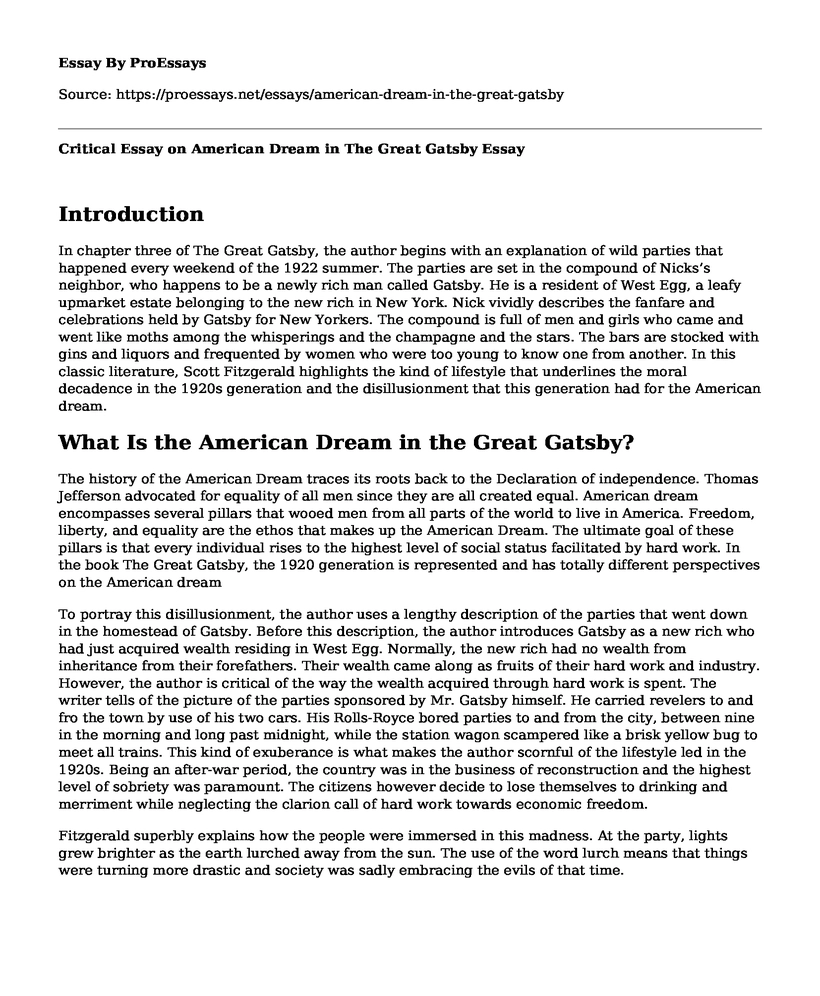Introduction
In chapter three of The Great Gatsby, the author begins with an explanation of wild parties that happened every weekend of the 1922 summer. The parties are set in the compound of Nicks’s neighbor, who happens to be a newly rich man called Gatsby. He is a resident of West Egg, a leafy upmarket estate belonging to the new rich in New York. Nick vividly describes the fanfare and celebrations held by Gatsby for New Yorkers. The compound is full of men and girls who came and went like moths among the whisperings and the champagne and the stars. The bars are stocked with gins and liquors and frequented by women who were too young to know one from another. In this classic literature, Scott Fitzgerald highlights the kind of lifestyle that underlines the moral decadence in the 1920s generation and the disillusionment that this generation had for the American dream.
What Is the American Dream in the Great Gatsby?
The history of the American Dream traces its roots back to the Declaration of independence. Thomas Jefferson advocated for equality of all men since they are all created equal. American dream encompasses several pillars that wooed men from all parts of the world to live in America. Freedom, liberty, and equality are the ethos that makes up the American Dream. The ultimate goal of these pillars is that every individual rises to the highest level of social status facilitated by hard work. In the book The Great Gatsby, the 1920 generation is represented and has totally different perspectives on the American dream
To portray this disillusionment, the author uses a lengthy description of the parties that went down in the homestead of Gatsby. Before this description, the author introduces Gatsby as a new rich who had just acquired wealth residing in West Egg. Normally, the new rich had no wealth from inheritance from their forefathers. Their wealth came along as fruits of their hard work and industry. However, the author is critical of the way the wealth acquired through hard work is spent. The writer tells of the picture of the parties sponsored by Mr. Gatsby himself. He carried revelers to and fro the town by use of his two cars. His Rolls-Royce bored parties to and from the city, between nine in the morning and long past midnight, while the station wagon scampered like a brisk yellow bug to meet all trains. This kind of exuberance is what makes the author scornful of the lifestyle led in the 1920s. Being an after-war period, the country was in the business of reconstruction and the highest level of sobriety was paramount. The citizens however decide to lose themselves to drinking and merriment while neglecting the clarion call of hard work towards economic freedom.
Fitzgerald superbly explains how the people were immersed in this madness. At the party, lights grew brighter as the earth lurched away from the sun. The use of the word lurch means that things were turning more drastic and society was sadly embracing the evils of that time.
Conclusion
The book The Great Gatsby is a true representation of dreams turning invalid. Many incidences narrated in the book exemplify a society that is swayed from the trail and is slowly embracing evil for a norm. The affluence of Mr. Gatsby, acquired through hard labor is spent poorly, thus eroding the American Dream for what all the hard work was.
Quotes About the American Dream in the Great Gatsby
- "Those who pursue the American Dream believe that no matter how much they accomplish, there is always something better to strive for."
- "Gatsby is one version of America—the resourceful, athletic, restless young nation striving to make itself better."
- "Americans, while occasionally willing to be serfs, have always been obstinate about being peasantry."
- "The problem is, America as Nick sees it isn't ideal anymore. It's beaten down, like George Wilson; or it's rich and careless, like Tom."
- "You're worth the whole damn bunch put together. I've always been glad I said that. It was the only compliment I ever gave him, because I disapproved of him from beginning to end."
Cite this page
Critical Essay on American Dream in The Great Gatsby. (2021, Mar 11). Retrieved from https://proessays.net/essays/american-dream-in-the-great-gatsby
If you are the original author of this essay and no longer wish to have it published on the ProEssays website, please click below to request its removal:
- Compare and Contrast Essay on Kant and Foucault
- Ethical Theory: Ethical Egoism Essay Example
- Cannery Row Essay Example
- Fetal Abortion Christian View Essay Example
- Essay Example on Death of a Salesman: A Reflection of 1940s American Dreams
- Book Review Sample on Caucasia: Danzy Senna's Fictional Exploration of Race & Discrimination
- Paper on Technology in Healthcare: Advancements, Legal Implications, and Ethical Considerations







